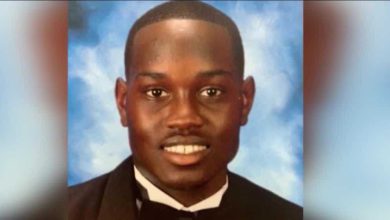
In a rare occasion, DeMaurice Smith found himself speechless.
The NFL Players Association’s executive director – a former trial lawyer – usually can render an extensive (and sometimes long-winded) answer on just about any topic or matter of debate.
But finding the words to sum up the range of emotions that he experienced during a mentally draining week proved challenging.
Smith learned last Wednesday that he was the subject of a disparaging, 10-year-old email chain of communication between now-former Las Vegas Raiders coach Jon Gruden and associates. The coach – working as an analyst for ESPN at the time – slammed Smith with racist criticisms of his physical features and his intelligence. And after news first reported by the Wall Street Journal broke, Gruden insisted that he was not a racist.
Smith watched as the reactions to Gruden’s behavior ranged from criticism from some in the NFL community to displays of loyalty as others defended the coach.
On Monday, additional details of the emails – some containing homophobic and misogynistic language – between Gruden and associates leaked. By night’s end, Gruden had resigned as the Raiders' head coach.
Smith discussed the trying episode with USA TODAY Sports, sharing his reaction to learning of Gruden’s comments about him, concerns about the league and his hopes that the troubling experience can somehow produce good.

Excerpts of the interview follow.
How would you sum up what these last five days have been like for you?
“I don’t know how to sum up the week. I’m not being coy. I just don’t know how to sum up the week. (Long pause) When I was asked to respond to the email, it was a combination of being somewhat disappointed, being somewhat shocked, and honestly, my first thought was, if this story is going to run, I need to talk to my family.
“As you can imagine, I had other things going on. We had the (NFLPA) vote (on whether to renew Smith’s contract) coming up on Friday, the DEA investigating Washington (trainer Ryan Vermillion), which touches player safety. … The best way of framing it is, when I got that news, it was, ‘OK, let me make sure I get in touch with my kids, and I need to go over and talk to my parents because I don’t want something like that to be heard by them from somebody else for the first time.’ They’re used to my role as an executive in America's sport. They know there are friends, not friends. People talk to them all the time. We talk about football and union stuff all the time. But this one was obviously different.”
When and how did you learn about Gruden’s comments about you?
“Wednesday. I was told, ‘There may be this email, mentioning you in a racist frame.’ … I saw the email later on Wednesday.”
Were you surprised at what was said and who said it?
“I didn’t have any reaction different from the overall reaction to it and who it was. Does that make sense? I wasn’t sitting around thinking, ‘Oh, my God, I’ll feel one way versus another way if it’s somebody else.’ To me, the email was about a group of people in an email obviously thinking they would never be caught, and that just means people are cavalier about trading insults. I knew it was four or five people on the email chain, and other than the two that I know, I don’t know who anybody else is. But honestly, my biggest takeaway was, ‘Wow, this was a group of people comfortable with saying things like that.’”
We know, as people of color, that there are often people that we come across, who may smile to your face, but behind your back, they’re making disparaging comments. It just happens. So, is that why you didn’t have much of a reaction to who it was?
“I don’t want to say it doesn’t matter who says it, because that’s not really true. But the reality is we know all sorts of people do that. People of all positions do that, and the fact that it was a coach or this coach didn’t matter as much as it simply confirms that people are still looking at you and saying things about you to your face that you know are substantially different from the way that they characterize you or caricaturize you behind your back.”
There were some people who threw conspiracy theories out there: that you leaked the report to improve your chances of being re-elected, that Roger Goodell did in an attempt to help you. What was your reaction to that?
“Well, I guess, first of all, you probably already know this, but I don’t spend a lot of my time reading a lot of media, and I’m also not a QAnon subscriber, either.
But did that frustrate you? These racist comments were made about you, and the view, for some, turned to accusatory.
“Yeah, there’s two positions that you’re talking about with one underlying theme. I tend to focus more on the commonality of the theme between them. ‘Let’s talk about anything other than racism.’ So, whether you want to be a conspiracy theorist or you want to get on TV and try to explain or defend what people have said, the common theme that unites both of those things is the one thing we don’t want to talk about is racism. It says a lot when some of the commentators chose to give (Gruden) cover by spending more energy explaining away the racism than calling it out. And instead of even responding to a conspiracy, or dealing with the apology by other people, I’ve just tried to focus on how we somehow make this better.
Did you come up with any answers?
“Well, if I came up with an answer on how to end racism, oh, I’d let you know! I think what makes racism pervasive and sustained is an unwillingness of people to confront the fact that racism remains America’s worst and continuing legacy. And when people engage in any device to avoid dealing with that, you simply continue to provide it and the people who support it with fuel.”
But part of the problem with fighting racism is some racist people don’t know they’re racist.
“Right. Look, what keeps racism alive is a refusal to acknowledge that it’s there. And anything that you can come up with to allow that belief that you can degenerate people and reduce people in a sexist, homophobic, racist, misogynist way allows you to continue to push this belief that there are some people who believe that other people are less than them. Right? And so, it doesn’t matter to me, really – the person who uttered the statement doesn’t matter as much to me as the fact that there was a group of people having this conversation.”
Does it concern you that the players that you represent are employed, led and coached by people who could think like Gruden?
“It’s nothing that I haven’t shared with players before. Perhaps not in a context of racism, except when we were talking about the Colin Kaepernick or social justice issues and when players were kneeling before the national anthem. I can be blamed for a lot of things, probably not being blunt is not one of them. You’ve seen me in team meetings and I don’t really spare the fact that owners and this league (have) a history of treating players as fungible commodities. All of that is rooted in a concept that they are somehow less valuable than other people.
"And so, I think, look, where we can fix this – or start to fix this – is to realize this isn’t an attack on football, or this isn’t a threat to football. And the sooner that we get to the fact that this isn’t a threat to football, then we don’t have to be in a world where you have to come up with some argument to engage in this because we have to protect football. The sooner that you accept that issues of sexism and homophobia and misogyny are real issues that threaten the integrity of everything that we do, you can build a construct where football is great, but football should never tolerate any of those things, and our workplaces should never tolerate any of those things, and how we select political candidates shouldn’t be subject to any of those things. The beauty of football and the sanctity of a workplace should be so valuable and so sought after that we should all simply make a decision that none of – neither football, nor the workplace, nor our churches or our schools – should tolerate anything that threatens the integrity of it.”
Some people defending Gruden were people of color, which could be confusing how they didn’t see the damaging potential of his words. Was that confusing?
“Whether you’re a person of color or not, you should get this. If you’re a person of color with any job, not to say a job that has a profile to it, you deal with a constant duality. And that duality is, on one hand, you are a person of color, or a woman or someone who finds themselves in a diverse situation where you are doing everything to simply rise to the challenges of the job, knowing that there are people who are thinking about you and saying things about you, or writing things about you. And you do your best to not be either a distraction, or worse, you know that the minute you get tagged with being an angry diverse person, that becomes the label, and that becomes a limiter on how well you can perform in this diverse environment. The other side of the duality is simply the reality that you are a diverse person and you shouldn’t have to temper or manage all of those emotions when other people are not asked to do the same thing.
"That’s the duality. And you spend an enormous amount of time being, from a personal standpoint, being ping-ponged between those dualities, and then there are times when something happens that forces you to be ping-ponged between the poles of those dualities. And when you see something like this, you are reminded that for a lot of people, it doesn’t matter where you want to school, how well you did in school. It doesn’t matter how well you’ve done in your job. It doesn’t matter whether you have met or exceed anybody else’s objective standards. The fact that someone can simply reduce you in a nanosecond to something less because of the color of your skin or your sexual preference or how you identify yourself makes your head explode. Again.”
Do you think the NFL should release the rest of the emails involving the Washington Football Team investigation now?
“I had a conversation with the league and the NFLPA plans to request that the NFL release the rest of the emails. And here’s the potential for good here. It took a long time for the league to recognize that they had not listened to the players and addressed their concerns about why players were kneeling or why players were actively becoming engaged in social-justice issues. Maybe there is the potential here for recognizing that there are people within our system that engage in or support ideas that we know are inconsistent with fairness and justice and equality, and maybe if we can embrace that quicker, then it gives us an opportunity to understand and fix what i believe are systemic problems in diverse hiring in the league. I think that is the hope. And maybe the best outcome for all of us.”
Were you glad to hear Gruden had resigned?
“That’s an interesting question. I’d be lying to you if I didn’t tell you there wasn’t a certain amount of numbness at this point. Again, you’ve caught me speechless. Does the fact that Jon Gruden is gone mean we’ve solved racism in football? No. If he had stayed, would it have continued to identify the problem that we have at almost every aspect of America? Sure. But, now that he’s resigned, do I have a more positive or less positive feeling? I don’t. I don’t have either.”
Follow USA TODAY Sports' Mike Jones on Twitter @ByMikeJones.







